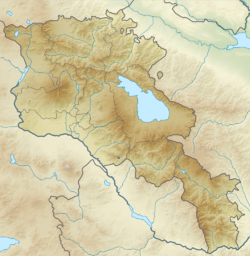1679 Armenia earthquake
| Local date | June 4, 1679[1] |
|---|---|
| Magnitude | 6.4 Ms[2] |
| Epicenter | 40°12′N 44°42′E / 40.2°N 44.7°E[2] |
| Areas affected | Yerevan Province, Safavid Iran |
| Max. intensity | MMI IX (Violent)–MMI X (Extreme)[2] |
| Casualties | 7,600 dead[2] |
The 1679 Armenia earthquake (also called Yerevan earthquake or Garni earthquake) took place on June 4 in the Yerevan region of Armenia, then part of the Safavid Iran.[1]
Numerous buildings were destroyed as a result of the earthquake. In Yerevan most notable structures were damaged. The Yerevan Fortress was destroyed, so were the following churches: Poghos-Petros, Katoghike, Zoravor and the Gethsemane Chapel.[1]
Furthermore, the nearby Kanaker village was destroyed. The classical Hellenistic Temple of Garni also collapsed.[3] Among many churches and monasteries that were reduced to ruins were Havuts Tar, Saint Sargis Monastery of Ushi, Hovhannavank, Geghard, and Khor Virap.[3]
See also
[edit]References
[edit]- ^ a b c Hakobyan, Tadevos (1979). Երևանի պատմությունը (1500–1800 ԹԹ.) [History of Yerevan (1500–1800)] (in Armenian). Yerevan State University Press. p. 328.
- ^ a b c d Utsu, T. R. (2002), "A List of Deadly Earthquakes in the World: 1500–2000", International Handbook of Earthquake & Engineering Seismology, Part A, Volume 81A (First ed.), Academic Press, p. 69, ISBN 978-0124406520
- ^ a b Hasrat'yan, Mourad (1995). "The medieval earthquakes of the Armenian Plateau and the historic towns of Ayrarat and Shirak (Dvin, Ani, Erevan)". Annali di Geofisica. 38 (5–6). National Institute of Geophysics and Volcanology: 721.
Further reading
[edit]- Guidoboni, E.; Haroutiunian, R.; Karakhanian, A. (2003), "The Garnì (Armenia) large earthquake on 14 June 1679: A new analysis", Journal of Seismology, 7 (3): 301–328, Bibcode:2003JSeis...7..301G, doi:10.1023/A:1024561622879, S2CID 126868275


 French
French Deutsch
Deutsch